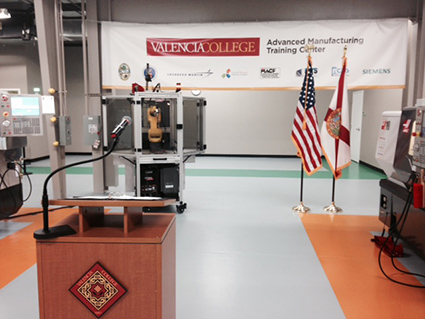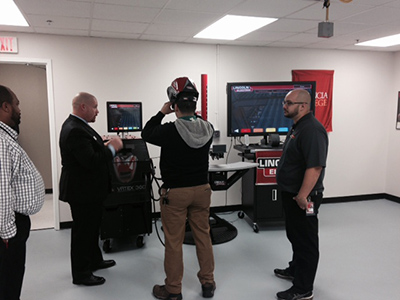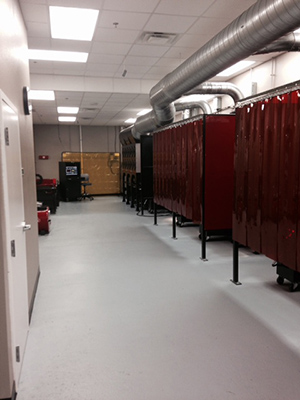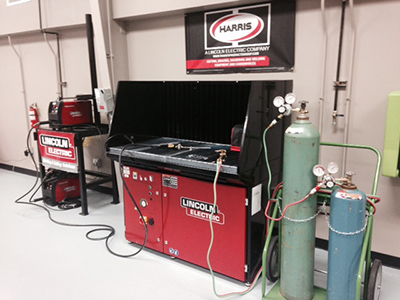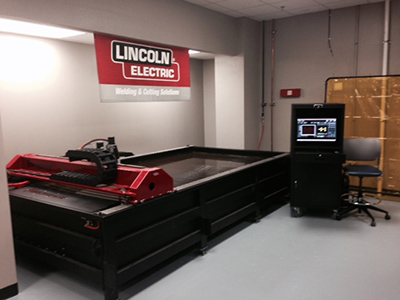Valencia College's New Advanced Manufacturing Training Center Fills Crucial Need
Valencia College’s Advanced Manufacturing Training Center was specifically funded to develop a workforce for a growing manufacturing base in Central Florida.
At the height of the Great Recession, Florida had lost more than half of its construction jobs and about one quarter of its manufacturing positions. New buildings and houses weren’t going up, and construction workers fled the area to find jobs. Many in the state worried that its manufacturing industry would never bounce back and that the skilled workers were gone.
Flash forward to 2016. The Orlando area’s population is increasing. The state is in the midst of a $2 billion construction project along I-4. And, the International Consortium for Advanced Manufacturing Research (ICAMR) will open a $70 million, state-of-the-art advanced manufacturing facility next year. What’s more, statistics from the Associated General Contractors of America show Florida added more than 30,000 construction jobs (an increase of 7.1 percent) between April 2015 and April 2016, as residential and commercial development in the state return to pre-recession levels.
These factors have bolstered hopes of bringing thousands of jobs to the region and positioning the state as a global manufacturing hub. The Manufacturers Association of Florida estimates that there are currently more than 5,000 job openings for skilled workers in the state. With manufacturing and construction once again on the rise in central Florida, businesses need workers trained in specialty trades to fill new jobs and those left vacant by retiring baby boomers. Local employers are searching for their next crew of skilled workers, and that’s where Valencia College can help.
“The employment needs in central Florida’s business community have evolved. While the two biggest industries in the state – hospitality and agriculture – remain important, another – manufacturing – is becoming increasingly prominent. Area manufacturers are asking for help in finding skilled workers,” says Sandy Shugart, president of Valencia College. “We are delighted to partner with them to help meet that need.”
Carl Harris, Valencia’s Advanced Manufacturing Training program director helped lead the charge to respond to the industry’s needs by creating a program where workers could gain the skills to become high-tech manufacturing workers. His envisions Valencia College becoming the premier training facility in the state of Florida.
“Our objective is to graduate more students, faster, and, most importantly, to help every student secure a job once they complete our program,” says Harris. “We want our students to be 100 percent prepared to go out and get a job – and we have a full-time program manager dedicated to doing just that.”
The central Florida-based college features five campuses and a school of public safety. It recently opened the new Advanced Manufacturing Training Center in Kissimmee, just south of Orlando, in a building originally constructed for a firearms manufacturer that never took over the space. Valencia was able to renovate and outfit the facility with help from a $2.5 million Trade Adjustment Assistance Community College and Career Training initiative (TAACCCT) grant from the U.S. Department of Labor and U.S. Department of Education. The 17,000-square-foot facility is designed to provide students with real-world, hands-on manufacturing experience.
Welding booths are equipped with modern, multi-process welding equipment and centralized fume exhaust system nozzles.
The center features two smart-technology classrooms and four labs – machining, assembly, quality and welding – for hands-on instruction, along with workstations, conference rooms, study lounges, and administrative offices. The welding lab houses 10 Lincoln Electric welding booths with the REALWELD® Trainer program, as well as the company’s robotic education cell, a VRTEX™ 360 virtual reality training simulator and a central fume extraction system. Students in the welding program, which is 80 percent hands-on training, start on the VRTEX 360 to practice their welding technique in a simulated environment. Instructors also have access to Lincoln Electric’s U/LINC curriculum, which provides a comprehensive collection of lesson plans, handouts, videos, presentations, assessments, and more, so they can focus on teaching.
Virtual reality welding simulators score weld performance and help identify trouble spots in each student’s welding technique.
Enrollment for the inaugural welding program, the first of its kind in Florida, filled to capacity, with students starting classes in the new facility in February. All 14 of these students elected to continue on to the more advanced Level 2 training after they completed the first, 24-week Level 1 program. Level 2 training spans 17.4 weeks. Florida requires at least 1,050 hours of welding training to pursue certification. The Valencia program makes it possible to achieve that in a condensed timeframe. Once technical training is complete, students have an opportunity to achieve one of nine available American Welding Society (AWS) certifications.
The school, starting with 14 initial students, is positioned to expand as enrollment is ramped up.
The school, starting with 14 initial students, is positioned to expand as enrollment is ramped up.
Level 1 curriculum includes sessions on the history of the manufacturing industry, soft-skills coaching covering everything from ethics to teamwork to computer skills – all items requested by employers – and basic welding skills – stick, MIG and TIG. Level 2 coursework takes students through advanced processes like robotic welding, automation and CNC plasma cutting.
In addition to obtaining critical industry certifications, students wrap up their studies by receiving help with crucial employment skills. Faculty members provide interview and resume writing techniques and lead students in mock interviews to help them prepare for landing jobs and launching successful careers.
An industrial CNC plasma cutting system allows students to practice design and
programming skills to cut complex 2-D shapes on sheet metal or plate.
One of the school’s main metrics of success is that it aims to have all students successfully obtain their certifications and employment upon completion. Harris says the program’s core competency is being able to get every graduate a job in construction, manufacturing or their field of choice. A full-time program coordinator is poised to place every member of the initial class upon graduation.
The college also is building relationships with area manufacturing and construction employers such as Lockheed Martin, Mitsubishi, Custom Metal Designs, Nautique Boat Co., Siemens Corp., and CareerSource Central Florida to help better determine the area’s workforce needs and further tailor training approaches to meet them. Such industry partners greatly influence curriculum planning and provide guidance and support to ensure that graduates have skills that match the region’s career opportunities.
“This is a great example of how the community and industry can partner together to educate and train students for high-skill, high-wage employment through an intensive, short-term training program,” says Joe Battista, Valencia’s vice president for Global, Professional and Continuing Education. “We are all working together to improve the employment opportunities for those who were unemployed, underemployed or just seeking a new career.”
The second wave of students joining Valencia College’s welding program will start classes in July, effectively doubling the program’s initial enrollment. Similar to the first class, the second session’s capacity was full months before courses begin.
Valencia is committed to providing a pipeline of workers of all skill levels to meet the needs of central Florida manufacturers. With an increased number of qualified employees, the college is confident that businesses will continue to thrive and grow in the state.

